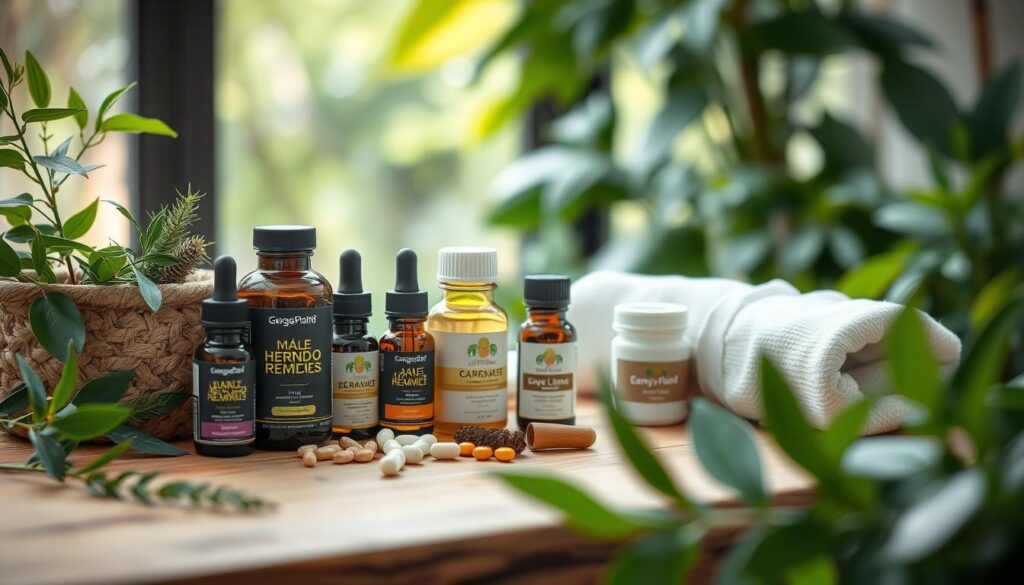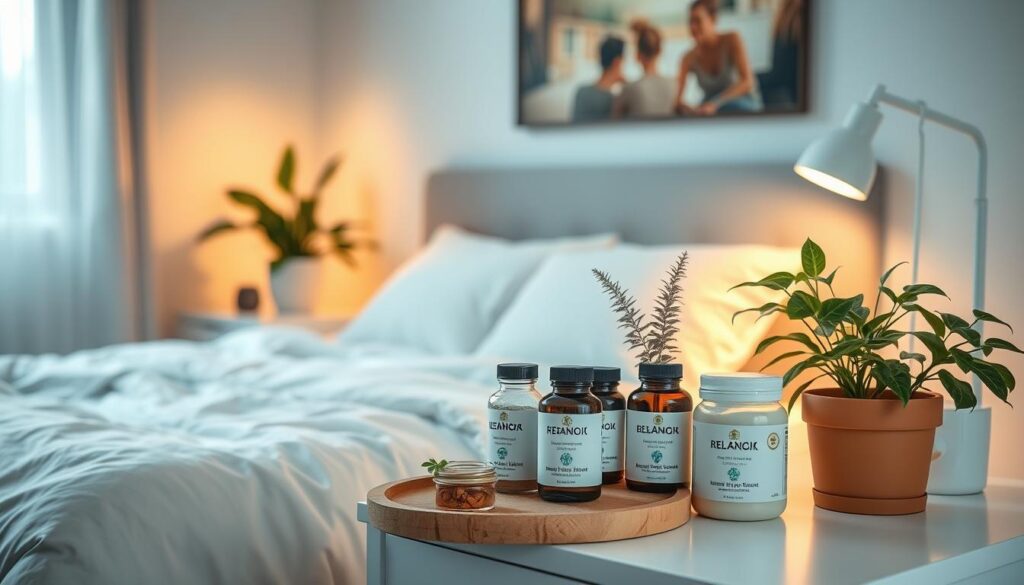Decreased Male Libido Treatment is a common issue for men. It can affect relationships and how you feel about yourself. If you’re looking for treatment for low male libido, there are natural ways to help.
Things like anxiety, relationship problems, health issues, and age can lower libido. But, you can make changes to increase your sex drive. Low libido male treatment includes managing stress, improving relationships, and enhancing sex life. You can also boost health with diet, exercise, and herbal remedies.
Remember, a drop in libido isn’t always bad. It’s not set in stone what’s “normal.” If low libido is affecting your life, try natural libido treatment male options. They can help you feel more confident and improve your sex life.
Key Takeaways
- Low libido is a common concern among men and can be influenced by factors like anxiety, relationship issues, health, and age.
- Natural treatment options for low male libido include stress management, focusing on intimate relationships, and enhancing sexual experiences.
- Improving overall health through diet, exercise, and herbal remedies can also help boost libido.
- A decline in libido is not always problematic, and there is no “normal” level of sex drive.
- If you’re concerned about your libido, exploring natural treatment options can help improve your sexual well-being and confidence.
Understanding Low Libido in Males
Low libido, or decreased sex drive, is a common issue for men of all ages. It’s normal for sexual desire to change over time. But, if it doesn’t go back to normal, it can affect a man’s life and relationships. Treatment for low libido in males often involves looking at both physical and mental health.

Defining Libido and Its Variations
Libido is about a person’s sexual drive or desire for sex. It varies from person to person and can change for many reasons. For men, healthy testosterone levels are between 450 and 600 nanograms per deciliter (ng/dL). Levels below 300 ng/dL are considered low, which can lower libido.
Factors Affecting Male Libido
Many things can affect a man’s libido, including:
- Age: Testosterone levels drop by up to 2% each year after 30, which can slow down sexual desire.
- Chronic health conditions: Heart disease, COPD, type 2 diabetes, chronic pain, cancer, obesity, high blood pressure, high cholesterol, and chronic lung, heart, kidney, and liver failure can all impact sexual function and desire.
- Mental health: Anxiety, depression, stress, and personal burnout can lower sex drive and erectile dysfunction.
- Lifestyle habits: Heavy alcohol consumption (more than 15 drinks per week), smoking, and illicit drug use can decrease testosterone levels and libido.
- Over-exercising: While regular exercise is good, too much can be linked to lower libido scores in males.
By knowing what affects male libido, men can take steps to treat low libido. This can improve their sexual health and overall well-being.
Anxiety and Stress Management
Anxiety and stress can really affect a man’s sex life. Guys with busy jobs or taking care of family might feel tired and less interested in sex. These feelings can make it hard to get or keep an erection, or even lead to early ejaculation.
Studies show that anxiety and depression can lower sex drive and cause sexual problems. In fact, most cases of erectile dysfunction (ED) are linked to mental health. ED is when a man can’t get or keep an erection long enough for sex. It affects about 18 million American men over 20.
Impact of Anxiety on Sexual Functioning
Stress and anxiety can mess with hormone levels, which might lower sex drive. Feeling anxious about sex can make it even harder to get an erection. This creates a cycle where anxiety about sex makes it worse.
Research links ED to mental health issues like depression, stress, and relationship problems. It also shows a link to low self-esteem and confidence.
Interestingly, some research found that men with performance anxiety might seek sex outside of steady relationships.
Stress Reduction Techniques
To fight anxiety and boost mental health, there are helpful techniques. These can improve low libido and sexual problems. Some include:
| Technique | Benefits |
|---|---|
| Meditation | Can change brain chemistry to reduce stress |
| Yoga | Promotes relaxation and mindfulness |
| Acupuncture | May help alleviate stress and anxiety |
| Guided meditations | Encourages focused relaxation |
| Regular exercise | Reduces stress and improves overall health |
Living a healthy lifestyle, talking openly with your partner, and seeking counseling can also help. The American Urological Association suggests treating ED with a mix of counseling, therapy, medication, and lifestyle changes.
Psychological factors are the most common cause of ED, with studies indicating that psychological ED affects about 90% of teenagers and young men.
By tackling anxiety and stress, men can improve their sex life and overall well-being. Getting help from healthcare professionals and trying different treatments is key to managing low libido.
Focusing on Intimate Relationships
Keeping a strong and healthy intimate relationship is key to solving treatment for low libido in males. When couples face a gap in desire, talking openly and doing things together can spark the flame again. A study with 229 people found 17 ways to deal with desire gaps, grouped into five areas:
- Disengagement
- Communication
- Engagement in activity alone
- Engagement in other activity with the partner
- Having sex anyway
Research showed that doing things together was better for both sex and relationship happiness than doing things alone. People who found their strategies very helpful were happier than those who didn’t find them helpful.

A U.S. study found that those who were happier with sex had more of it. They also got more oral sex and tried different things. This shows how important talking and trying new things are for a happy relationship.
| Strategy | Description |
|---|---|
| Planning date nights | Setting aside dedicated time for quality interactions and bonding |
| Participating in activities together | Engaging in shared interests and hobbies outside the bedroom |
| Practicing open communication | Discussing desires, concerns, and feelings openly and honestly |
| Setting aside quality time | Making time for intimacy and connection amidst busy schedules |
By working on their emotional bond, couples can tackle low libido and boost their happiness in sex and relationships. Remember, a strong intimate relationship is built on trust, communication, and mutual effort.
“The best and most beautiful things in the world cannot be seen or even touched – they must be felt with the heart.” – Helen Keller
Enhancing Sexual Experiences
Improving sexual experiences can help with decreased male libido treatment. Enjoyable and satisfying sex can boost desire for intimacy. It also helps with low libido male treatment concerns.
Importance of Foreplay
Foreplay is key for women’s sexual pleasure. Only 18% of women orgasm from just penetrative sex. But, 33.6% need clitoral stimulation. Sensual touching, kissing, and body exploration can increase arousal and satisfaction.

Incorporating Outercourse
Outercourse, or non-penetrative sex, can enhance experiences and treat low libido. It includes activities like sensual massage, using sex toys, oral sex, and mutual masturbation.
- Sensual massage
- Using sex toys
- Performing oral sex
- Mutual masturbation
Adding these to sex can bring new sensations and intimacy. It can also reignite passion and desire. This makes treating decreased male libido more effective.
| Outercourse Activity | Benefits |
|---|---|
| Sensual massage | Relaxation, increased intimacy |
| Using sex toys | Novelty, enhanced stimulation |
| Performing oral sex | Increased arousal, focused pleasure |
| Mutual masturbation | Learning about each other’s preferences |
The greatest pleasure in life is doing what people say you cannot do.
By focusing on foreplay and outercourse, couples can have a more fulfilling life. This is key for treating decreased male libido and improving overall sexual health.
Sleep Quality and Libido
Sleep is key to our health, including our sex life. Poor sleep can hurt libido in both men and women. Getting better sleep can help boost libido naturally.

Insomnia and sleep apnea can lead to erectile dysfunction in men. Over half of men aged 40 to 70 face ED, with sleep quality playing a role. Women also see a drop in sexual desire with poor sleep.
Sleep-related erections decrease with age. Depression and anxiety can also affect these erections. A study with 275 participants found that bad sleep linked to higher sexual arousal in those with high testosterone. But, those with low testosterone felt more sexual dissatisfaction.
Improving sleep can make sex life better. Here are some tips:
- Stick to a sleep schedule
- Make your bedroom tech-free
- Try relaxation before bed
Sex can also help you sleep better. Hormones like oxytocin and prolactin make you feel relaxed, improving sleep. Sex also lowers stress hormones, helping you sleep better.
Seeing sleep as a way to boost libido is important. It’s part of a complete approach to sex health. By focusing on sleep, men and women can enjoy better sex lives and more fulfilling relationships.
Nutritious Diet for Improved Libido
Eating well is key for good health, including sex health. Foods that help blood flow and heart health can boost sex drive. Adding nutrient-rich foods to your diet is a smart low libido treatment male medicine choice.
Foods That Boost Circulation
Some foods can help improve libido because of their nutrients and how they affect blood flow. Here are some examples:
- Oysters: Rich in zinc, which is crucial for regulating testosterone levels
- Dark chocolate: Contains antioxidants that improve blood flow
- Watermelon: High in citrulline, which relaxes blood vessels similarly to Viagra
- Nuts and seeds: Provide healthy fats and arginine for better cardiovascular health
- Leafy greens: Offer nitrates that help expand blood vessels and improve stamina
| Food | Nutrient | Benefit |
|---|---|---|
| Oysters | Zinc | Regulates testosterone levels |
| Dark chocolate | Antioxidants | Improves blood flow |
| Watermelon | Citrulline | Relaxes blood vessels |
| Nuts and seeds | Healthy fats, arginine | Promotes cardiovascular health |
| Leafy greens | Nitrates | Expands blood vessels, improves stamina |
Avoiding Libido-Decreasing Foods
Some foods can lower libido, while others can help. To keep your sex drive healthy, limit or avoid:
- Processed foods
- Sugary snacks and beverages
- Excessive alcohol consumption
- Foods high in unhealthy fats
Remember, while a nutritious diet can be an effective treatment of decreased libido in males, it’s essential to consult with a healthcare professional to rule out any underlying medical conditions that may be affecting your sexual health.
“Let food be thy medicine and medicine be thy food.” – Hippocrates
Herbal Remedies for Increased Libido
For centuries, people have used herbal remedies to boost libido and improve sexual function. While there’s not much scientific proof, some studies suggest certain herbs might help. They could be useful for those looking for low libido treatment in males.
Potential Benefits of Herbal Supplements
Many herbal supplements show promise in boosting libido and sexual function in men. Ginseng, for instance, may help with erectile dysfunction. Dehydroepiandrosterone (DHEA) and L-arginine also seem to have benefits for sexual health.
| Herbal Supplement | Potential Benefits |
|---|---|
| Ginseng | Improves erectile dysfunction |
| DHEA | Increases libido in women and helps erectile dysfunction in men |
| L-arginine | Improves erectile dysfunction by stimulating blood flow |
| Yohimbe bark | Improves sexual dysfunction associated with SSRIs |
Precautions and Considerations
Herbal supplements might help with treatment of low libido in males, but use them with caution. They’re not regulated like medicines, so quality and safety can vary. Some may also interact with other drugs, causing problems.
Despite the availability of effective conventional treatments, herbal remedies continue to be popular among men seeking to improve their sexual life.
Before adding herbal supplements to your low libido treatment plan, talk to a healthcare professional. They can help you understand the benefits and risks. This ensures you make a well-informed choice for your sexual health.
Regular Exercise and Body Image
Regular exercise is a natural way to boost libido in males. It improves health and boosts self-confidence. When men feel good about their bodies, they often have more sexual desire and satisfaction.
A study with 1,077 men in endurance sports showed a link between exercise and libido. The men were split into two groups: those with normal-to-high libido and those with low libido. The study found that:
| Weekly Exercise Duration | Normal-to-High Libido Group | Low Libido Group |
|---|---|---|
| 4-6 hours | 33.1% | 10% |
| 7-10 hours | 35% | 23.3% |
| Over 10 hours | 22.2% | 65% |
The study showed that intense, long-term exercise might lower libido. However, the small low libido group limited the findings.
A review of 12 studies found that aerobic exercise helps men with erectile function. It showed that regular aerobic exercise can improve sexual function without drugs.
“Aerobic exercise is a natural treatment for low libido in males, improving sexual function and overall well-being.”
Adding regular exercise to your life can make you feel more connected to your body. It can also improve your self-image. By doing moderate, consistent exercise, you can naturally increase your libido and enhance your sexual experiences.
Maintaining a Healthy Body Weight
Being overweight can really hurt a man’s sex drive and ability to perform. Just a 4-inch increase in waist size can lower testosterone by 75%. This hormonal drop, along with heart issues and poor blood flow, can lead to low libido and erectile dysfunction (ED).
Medicines for obesity-related issues, like high blood pressure and heartburn, can cause ED. Severe obesity is also linked to depression, which can affect sex drive. Some antidepressants can even cause ED, so talking to a doctor about other options is key.
Impact of Obesity on Testosterone Levels
Low testosterone is a big reason for low libido in men. Men with ED often need to check their testosterone levels. The Massachusetts Male Aging Study found that 52% of men aged 40–70 had ED.
By 1995, over 152 million men worldwide had ED. By 2025, that number is expected to rise to 322 million men.
Balanced Diet and Regular Exercise
Keeping a healthy weight through diet and exercise can boost sex drive. Exercise helps by burning calories, reducing stress, and improving mood. Just 30 minutes of moderate exercise daily can make you feel better for up to 12 hours.
Try to exercise at least 5 days a week. This can improve body image and relationships.
A balanced diet is also key for a healthy weight and sex function. Lack of zinc, vitamin D, vitamin B12, and iron can lower sex drive. On the other hand, diets full of processed foods and sugar can harm hormones and libido. Eating right can enhance sexual pleasure and mental health, making sex more enjoyable.
Therapy and Counseling
Seeking help through therapy and counseling can be a great way to tackle treatment for low male libido. It’s key to tackle both the physical and mental sides of low libido. Even if a physical issue like diabetes or hormonal imbalances is present, improving how you feel about sex can boost your libido.
Individual counseling offers a safe space to talk about negative views on sex and self-esteem. It also helps with issues like depression and anxiety that can lower libido. By working on these mental health areas, men can see a better view of their sexuality and overall well-being.
Addressing Psychological Factors
Relationship counseling is also very helpful for couples facing libido issues. In these sessions, partners can share what affects their desire for sex and find ways to overcome it. This teamwork builds understanding, communication, and closeness, all important for a fulfilling sex life.
Cognitive Behavioral Therapy (CBT)
Cognitive Behavioral Therapy (CBT) is a libido treatment for males with good results. It helps change negative thoughts and behaviors that lead to sexual problems. By learning new ways to think and cope, CBT can enhance sexual function and overall happiness.
“Therapy is not about giving advice, it’s about helping people find their own solutions.” – Dr. John Gottman
Starting therapy for low male libido takes courage and dedication. But with a skilled therapist, men can learn a lot, develop coping strategies, and find joy in a healthy sex life again.
Quitting Smoking for Better Sexual Health
Smoking cigarettes harms the heart, which is key for good sex health. Quitting smoking boosts energy and sex drive. This makes it easier to treat low libido in men.
Smoking makes people feel anxious and tense, which lowers sex desire. Quitting reduces stress and balances hormones, boosting libido. Just 20 minutes after quitting, the body starts to feel better.
Quitting improves blood flow, making erections firmer and orgasms more intense. In nine months, lung capacity can grow by 10%, boosting stamina. This means better sex performance.
Smoking harms looks and skin health, but quitting improves both. It also cuts the risk of erectile dysfunction by 50%, helping men get harder erections. This leads to better sex.
| Smoking and Erectile Dysfunction (ED) | Statistics |
|---|---|
| Men in the USA estimated to suffer from ED | 34 million |
| Men worldwide estimated to suffer from ED | >150 million |
| Increased likelihood of ED in chronic smokers compared to nonsmokers | 1.5 to 2 times |
Research shows quitting smoking greatly improves sex health. One study found better erections in 20 quitters compared to 45 who relapsed. Another study showed better blood flow in heavy smokers after quitting.
Quitting smoking is key for treating low libido in men. It leads to better sex health, performance, and satisfaction in relationships.
Testosterone Replacement Therapy
Testosterone is key for male libido. As men get older, their testosterone levels drop. By age 70, about 30% of men have low testosterone, leading to less sex drive and erectile issues. Testosterone replacement therapy (TRT) might help men with low testosterone and low libido.
Testosterone Deficiency and Hypogonadism
Testosterone deficiency, or hypogonadism, affects about 1 in 50 men. It causes low libido, energy loss, erectile problems, sleep issues, and focus problems. Men with low testosterone are more likely to have erectile dysfunction. TRT can boost libido, reduce depression, and improve erectile function in men with hypogonadism.
Studies show TRT is effective for treating low libido in men:
| Study | Outcome |
|---|---|
| Testosterone Trials | Men using testosterone gel had an IIEF-ED score 2.64 points greater than the placebo arm after 1 year |
| Meta-analysis of 14 RCTs | Mean difference in IIEF-EF between TTh and placebo was 2.31 points |
| Spitzer et al. | Men with low testosterone levels had an IIEF-EF score 1.01 points higher with dual therapy (sildenafil + testosterone) after 14 weeks |
Dietary Components for Testosterone Support
While there’s not much proof that foods or supplements greatly boost testosterone, some foods might help support testosterone production:
- Zinc: Essential for testosterone synthesis and may help maintain healthy testosterone levels
- Vitamin D: Low vitamin D levels have been associated with lower testosterone levels
- Omega-3 fatty acids: May help improve testicular function and testosterone production
Exercise and a healthy diet can also help boost testosterone levels. Keeping a healthy weight is key for optimal testosterone production and sexual health.
Approximately 35% of men in their 70s have low testosterone, and more men in their 20s are experiencing low-T at male urology clinics.
When looking at treatments for low libido in men, talking to a healthcare professional is crucial. They can help find the cause and suggest the best treatment. TRT, along with lifestyle changes and diet, can help manage low libido and improve sexual function in men with testosterone deficiency.
Hormonal Balance in Females
Hormonal imbalances can greatly affect a woman’s sex drive and overall health. Estrogen, progesterone, and testosterone are key in controlling libido. Changes in these hormones can cause a decrease in sex drive. In fact, hormonal issues are behind 70% of low libido cases in women.
During menopause, estrogen levels drop, leading to lower libido and vaginal dryness. Estrogen therapy can help some women. Using lubricants can also make sex more comfortable and enjoyable.
Some birth control pills can also lower libido. If you think your birth control is affecting your sex drive, talk to your doctor about other options.
High cortisol levels, caused by chronic stress, can also lower libido. Symptoms of high cortisol include:
- Cravings for carbohydrates and sugar
- Belly fat and weight gain
- Sleep disturbances
- Skin breakouts
- Blood sugar instability
- Exhaustion
Estrogen imbalances can cause bloating, headaches, PMS, mood swings, weight gain, and vaginal dryness. Testosterone imbalances, often due to birth control, can lead to acne, anxiety, low energy, irregular periods, and low self-confidence.
Low thyroid function, linked to high cortisol or autoimmune diseases like Hashimoto’s, can lower libido. It can also cause depression, weight gain, poor circulation, and morning fatigue.
To improve libido, consider herbal remedies like ashwagandha to lower cortisol and maca powder to boost libido. For women going through menopause, hormone replacement therapy (HRT) can help balance hormones and address treatment for low libido in females.
Consulting with a Healthcare Professional
When you’re dealing with low libido, talking to a doctor is a big step. Low libido can come from many places, like your mind, lifestyle, or health. A doctor can help figure out why you’re feeling this way and find the right treatment for you.
Doctors who focus on men’s health, like urologists and endocrinologists, are great resources. Urologists know a lot about the male body and can spot problems that might be causing low libido. Endocrinologists, on the other hand, check for hormone imbalances that could be affecting your sex drive.
When to Seek Medical Advice
Knowing when to see a doctor for low libido is important. If you’ve been feeling this way for weeks and it’s affecting your life or relationships, it’s time to talk to a doctor. Also, if you’re tired, feeling down, having trouble getting an erection, or gaining weight without trying, you should see a doctor.
Doctors will ask you about your health, sex life, and symptoms. They might also suggest blood tests to check your hormones and other health markers. These tests can show if there’s a health issue causing your low libido.
Alternative and Complementary Medicine
Some men find help with low libido from other methods besides traditional medicine. These can include:
- Herbal supplements: Some herbs, like ginseng and maca root, might help boost your sex drive.
- Acupuncture: This ancient practice uses needles to help balance your body and improve sexual function.
- Massage therapy: Massage can help reduce stress, improve blood flow, and make you feel more relaxed, which might help your libido.
But, it’s key to remember that these methods might not work for everyone. Always talk to a doctor before trying them.
| Lifestyle Factors | Psychological Factors | Medical Factors |
|---|---|---|
| Poor diet | Stress | Hormonal imbalances |
| Lack of exercise | Anxiety | Low testosterone levels |
| Insufficient sleep | Depression | Diabetes |
| Excessive alcohol consumption | Relationship issues | Obesity |
| Smoking | Cardiovascular diseases |
By working with doctors and trying different treatments, men can take steps to improve their libido and overall health.
Decreased Male Libido Treatment: A Holistic Approach
Treating low male libido needs a mix of lifestyle, psychological, and medical steps. Everyone’s sexual desires are different. But if low libido lasts weeks and hurts relationships, it’s time to see a doctor.
Doctors start by looking at your medical history and what meds you take. They also do physical checks and blood tests. These tests check for things like blood sugar, testosterone, and thyroid levels. Finding the right treatment depends on what’s causing the low libido.
Lifestyle choices affect male libido a lot. Bad diet, not enough exercise or sleep, too much alcohol, and smoking can lower sexual desire. Eating well, like the Mediterranean Diet, and staying active can help. Keeping a healthy weight is also key for good sexual health.
Stress, anxiety, depression, and relationship problems also affect libido. Doctors might suggest talking to a therapist or couples counselor. Some herbal supplements, like Fenugreek and Tongkat Ali, can also help improve libido and overall life quality.
| Factor | Impact on Male Libido |
|---|---|
| Low testosterone levels | Naturally decline after age 30 |
| Smoking | Lowers testosterone levels |
| Alcohol and recreational drugs | Linked to lower libido |
| Erectile dysfunction and ejaculation issues | Can suppress libido |
| Zinc supplementation | Improves testosterone levels |
Low libido affects 20 to 25% of men.
When looking for treatment for low male libido, hormone levels are checked often. This helps doctors adjust treatment plans. A holistic approach that looks at lifestyle, psychology, and health can really help improve libido and sexual well-being.
Conclusion
Decreased male libido is a complex issue with many causes. These include hormonal imbalances, psychological factors, and lifestyle choices. While low libido treatment male medicine options exist, treating it holistically is key. This means making lifestyle changes, seeking therapy, and getting medical help that fits your needs.
Keeping overall health in check is vital for sexual wellness. Regular exercise, a balanced diet, enough sleep, and managing stress can boost libido. It’s also important to treat any medical issues, like heart disease or low testosterone.
Psychological factors, like relationship problems, stress, and depression, can affect libido too. Cognitive behavioral therapy (CBT) and counseling can help. Talking openly with your partner and focusing on intimacy and emotional connection can also improve your sex life.
The best way to treat decreased male libido varies for each person. By working with healthcare professionals, trying natural solutions, and focusing on overall well-being, men can improve their sexual health and quality of life.






